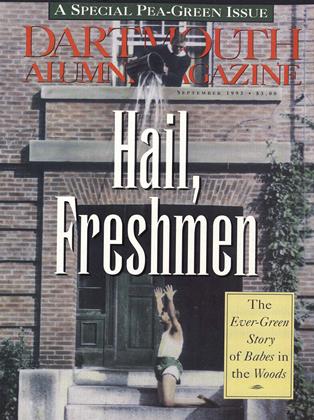From The Freshman to The Graduate, the movies goto college.
AMONG THE MANY new freedoms freshmen discover on campus is the chance to go to as many movies as they want, without anyone objecting. Quite the opposite: Dartmouth's Film Society lures students to Spaulding's big screen at least a couple of times a week. Then there is the College's Loew Auditorium, Hanover's Nugget, and so on down the valley. If that's not enough, students can flick-feast in the Film Studies Department, which not only keeps them watching but also gets them thinking. Says Assistant Professor of Film Studies Amy Lawrence, "I want all Dartmouth students to understand what goes into making films—the technology, production, writing. It's a good education for doing anything."
As a Film Society advisor, Lawrence ushers students toward an ever-wider knowledge of film. She explains that each term-long FilmSociety theme includes new pop movies to attract new people, foreign films to broaden perspectives, and silent films—complete with live piano—as historical cal markers. "It's like a class, introducing people to all facets of a subject," she says.
According to Lawrence, who admits to being fully screen-struck ("I've always loved films"), something special happens when people watch movies, something quite different from book-learning. "Reading seems kind of private," she explains. "Film-going is public. You do it with all your friends." And as soon as the film is over, she adds, "you immediately start talking about it."
Whether post-film discussions turn serious or silly, the collective act of watching movies takes on an extra dimension when it happens at college. Recalls Bill Scherman '34, back when the Nugget used to be behind Casque & Gauntlet, students filled the 7 p.m. showing, threw peanuts, and, in the absence of townsfolk (who waited 'till the 9 p.m. showing), unrestrainedly responded to the provocative bits of every film. Knowing how to act at the Nugget was all part of fitting in at Dartmouth.
Fitting in and finding oneself—the quests, sometimes compatible, sometimes conflicting, that fill so much of the college years—are, according to Lawrence, precisely what films about college depict. The camera captures these themes as they emerge in both the mundane and the critical choices students make during their education. From the football field to the lecture hall, from how one dresses to the activities one joins, from playing by the rules to inventing new terms of being, from the social to the political, idealism to rebellion, success to failure, opting in to opting out, students and the films about them face the dilemmas of growing into adulthood. Dartmouth favorites run the gamut. Maury Rapf's '35 Hollywoodish "Winter Carnival" is as idealized as the "Animal House" of Chris Miller '63 is outrageous. And then there are the films Dartmouth students make each year about life on campus, including drinking, eating disorders, coming out, and protests—films that, as Lawrence puts it, "take the pulse of the student community." Even long after college the spell of those provocative years remains. Citing "The Group", "The Big Chill", and "The Return of the Secaucus 7" (produced by Bill Aydelott '72), Lawrence says, "College shines forth as the defining experience perience of who you become and who you were."
Welcome to college, freshmen past and present. If you're on campus this term, drop by Spaulding. The Dartmouth Film Society's fall term theme is "School Daze."
KAREN ENDICOTT is FacultyEditor of this magazine.
 View Full Issue
View Full Issue
More From This Issue
-
 Feature
FeatureI Was A Freshman Trip Spy
September 1993 By Todd Balf -
 Feature
FeatureFifty-Five Out
September 1993 By Judson D. Hale '55 -
 Feature
FeatureThe Next Bus Home
September 1993 By Regina Barreca '79 -
 Feature
FeatureThe First Year
September 1993 -
 Feature
FeatureHow Do You Socialize a Freshman?
September 1993 By Heather Killebrew '89 -
 Cover Story
Cover StoryThey have been called freshies, Pea Greeners, shmen a current phrase that cannot be uttered without sneering.
September 1993
karen Endicott
-
 Article
ArticleEnglish Professor Jeffery Hart '51
February 1992 By Karen Endicott -
 Article
ArticleHold that Curriculum
June 1993 By Karen Endicott -
 Article
ArticleDaedalus with a Power Glove
OCTOBER 1994 By Karen Endicott -
 Article
ArticleCopper Crown
October 1995 By Karen Endicott -
 HISTORY
HISTORYShall We Dance?
Sept/Oct 2000 By Karen Endicott -
 Article
ArticleCOMPUTING AND THE RING OF INVISIBILITY
JUNE 1991 By Professor James Moor, Karen Endicott








